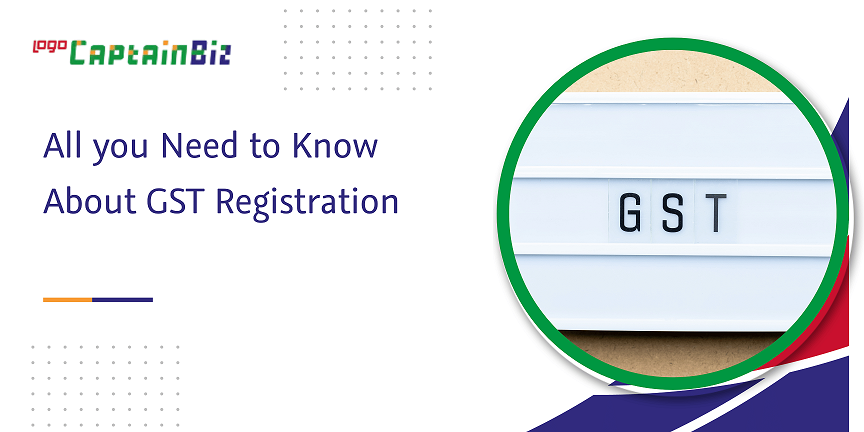From Start to End Up: The Ultimate Roadmap to GST Registration for Companies Seeking Financial Security
Navigating the intricacies of Item and Solutions Tax (GST) registration is an essential action for organizations pursuing financial security. From comprehending the fundamental concepts of GST to adhering to post-registration standards, the procedure can appear intimidating in the beginning glance. However, damaging down the roadmap into workable actions can streamline the registration trip for services wanting to improve their financial standing. Allow's discover the vital parts that compose this best roadmap and find exactly how each phase adds to laying a strong foundation for financial success.
Understanding GST Essentials
Diving into the essential concepts of Product and Services Tax (GST) is crucial for obtaining a detailed understanding of its implications on organizations and the economic situation. Input Tax Obligation Debt (ITC) is a significant function of GST, enabling companies to assert credit history for tax obligations paid on inputs, reducing the total tax concern. Understanding the essentials of GST is essential for services to conform with tax obligation laws, handle their financial resources successfully, and add to the nation's financial development by participating in a transparent tax system.
Qualification Requirements for Enrollment
To sign up for GST, organizations have to meet details qualification requirements established by the government. The primary qualification requirement is that any organization associated with the supply of goods or services with a yearly accumulation turn over above the threshold limitation set by the authorities should sign up for GST. As of the existing laws, the threshold restriction for GST enrollment is an annual aggregate turn over of 40 lakhs for businesses running within a state, with the exception of unique classification states where the limit is 20 lakhs. Additionally, specific organizations are required to sign up for GST regardless of their turn over, such as interstate distributors, laid-back taxable persons, and companies reliant pay tax under the reverse cost system. It is important for businesses to thoroughly assess their turn over and transaction types to establish their GST registration obligations properly. Failing to sign up for GST when eligible can cause penalties and lawful repercussions, making it crucial for services to follow the defined qualification standards.
Documents Needed for Enrollment
Having fulfilled the eligibility requirements for GST enrollment, businesses have to currently guarantee they have the requisite papers in area to proceed with the enrollment process efficiently. The papers needed for GST registration generally include proof of organization constitution, such as partnership deed, registration certification, or unification certificate for different kinds of organizations. Additionally, businesses need to give records establishing the primary business, such as a rental arrangement or power expense. PAN card of business, along with the identification and address proof of promoters/partners/directors, are important for confirmation objectives. Financial institution account declarations, together with canceled cheques or a duplicate of the financial institution passbook, are required to confirm the economic information link supplied during registration. Furthermore, businesses should have electronic signatures ready for the authorized notary. Making certain all these records are arranged and readily available will quicken the GST enrollment procedure, enabling companies to comply with tax obligation laws seamlessly.
Step-by-Step Enrollment Process
Beginning the GST enrollment process involves a collection of structured steps to make certain a compliant and seamless registration for businesses. The primary step is to check out the GST site and submit the registration kind with exact information of the company entity. Following this, the applicant gets a Temporary Recommendation Number (TRN) which is made use of to return to the application process if it's not completed in one go.
Following, all called for files as per the checklist offered by the GST portal requirement to be posted. These records normally consist of evidence of business identification, address and registration proofs of promoters, financial statements, and company entity's PAN card.

Post-Registration Compliance Guidelines

Verdict
Finally, services looking for financial security needs to understand the basics of GST, satisfy qualification standards, collect essential records, page follow the step-by-step registration process, and abide by post-registration guidelines - Best GST registration services in Singapore. By adhering to these actions, services can ensure compliance with tax obligation laws and preserve financial stability in the future
Additionally, particular services are needed to register for GST irrespective of their turn over, such as interstate vendors, casual taxed individuals, and organizations responsible to pay tax obligation under the reverse charge system.Having fulfilled the qualification criteria for GST enrollment, companies need to now guarantee they have the requisite documents in area to proceed with the registration procedure successfully. The papers required for GST enrollment typically consist of proof of service constitution, such as partnership action, registration certification, or consolidation certification for different kinds of organizations. Furthermore, businesses need to give files developing the primary place of service, such as a rental arrangement or electrical energy bill.Starting the GST registration process entails a series of structured actions to guarantee a smooth and certified enrollment for companies.